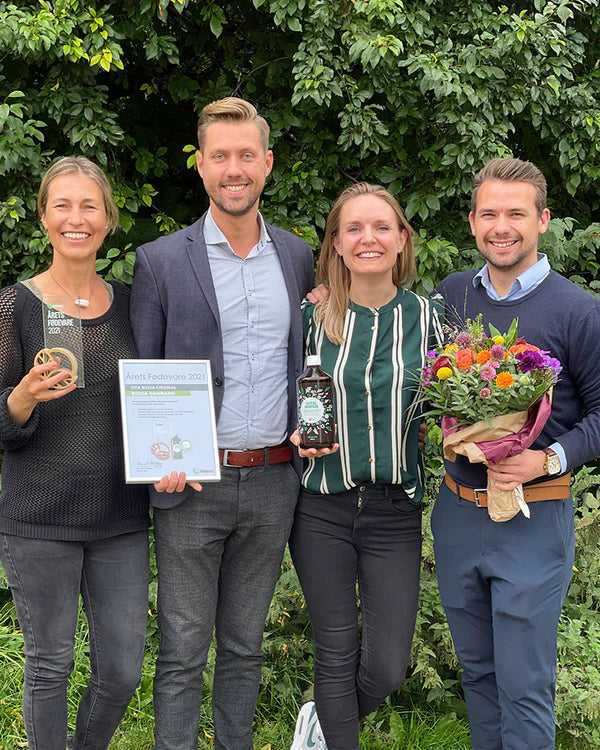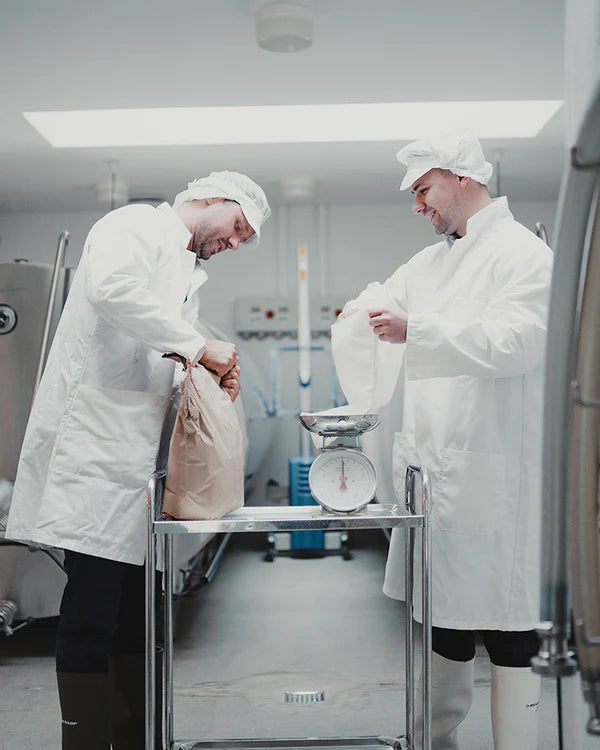The process
Biosa's products are manufactured through a fermentation process, where lactic acid bacteria and herbs are mixed with water and molasses. The lactic acid bacteria convert the sugar in the molasses into organic acids. These organic acids make the products self-preserving, and when the last trace of sugar in the molasses is converted, the fermentation process is complete. Once the fermentation process is finished and the product has been tested and approved, we bottle and label the product. Then it is ready to be sent out to stores around world.
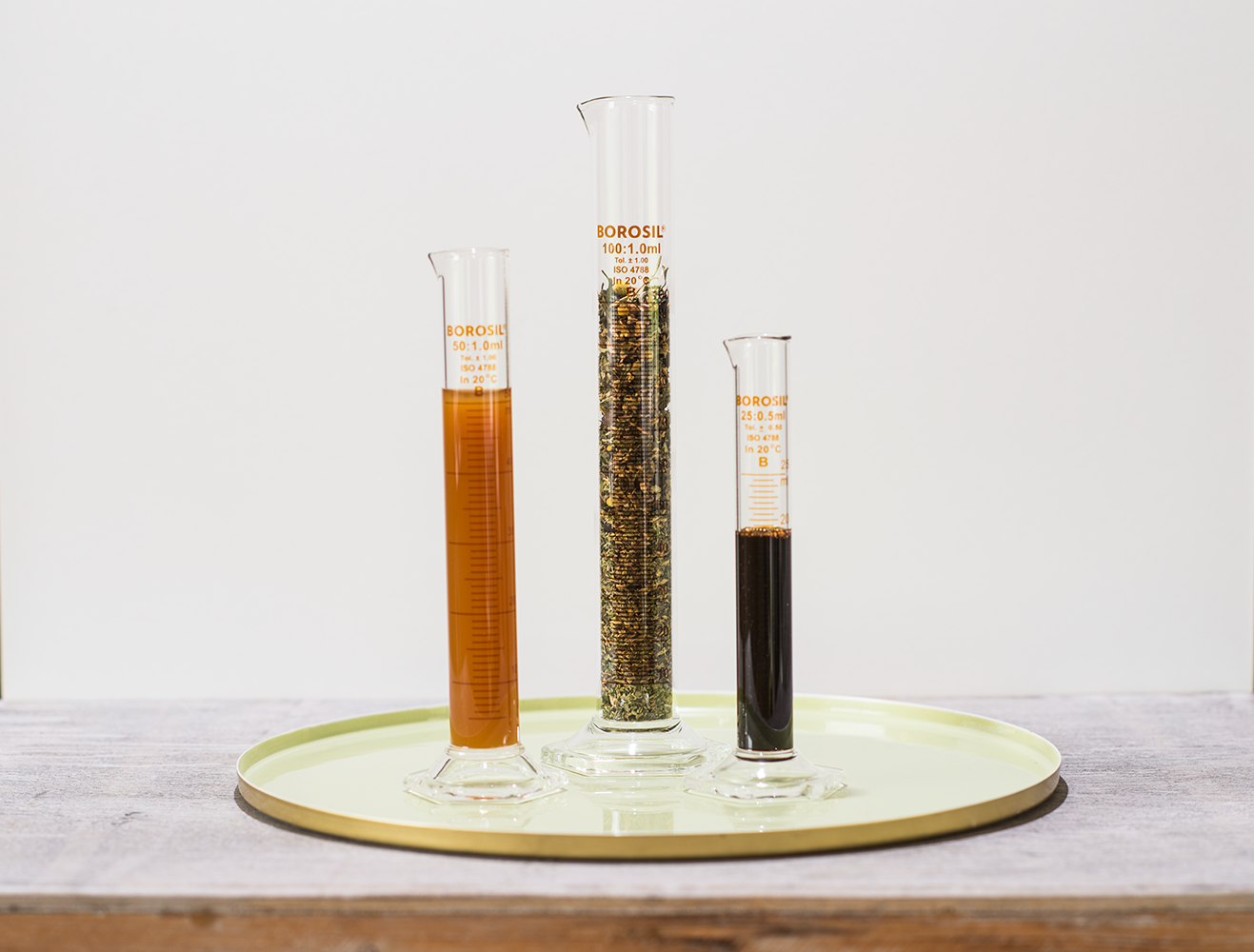
1. Raw ingredients
In our production, we use organic ingredients. Biosa's products mainly rely on four ingredients: lactic acid bacteria, herbs, molasses, and water.
Read more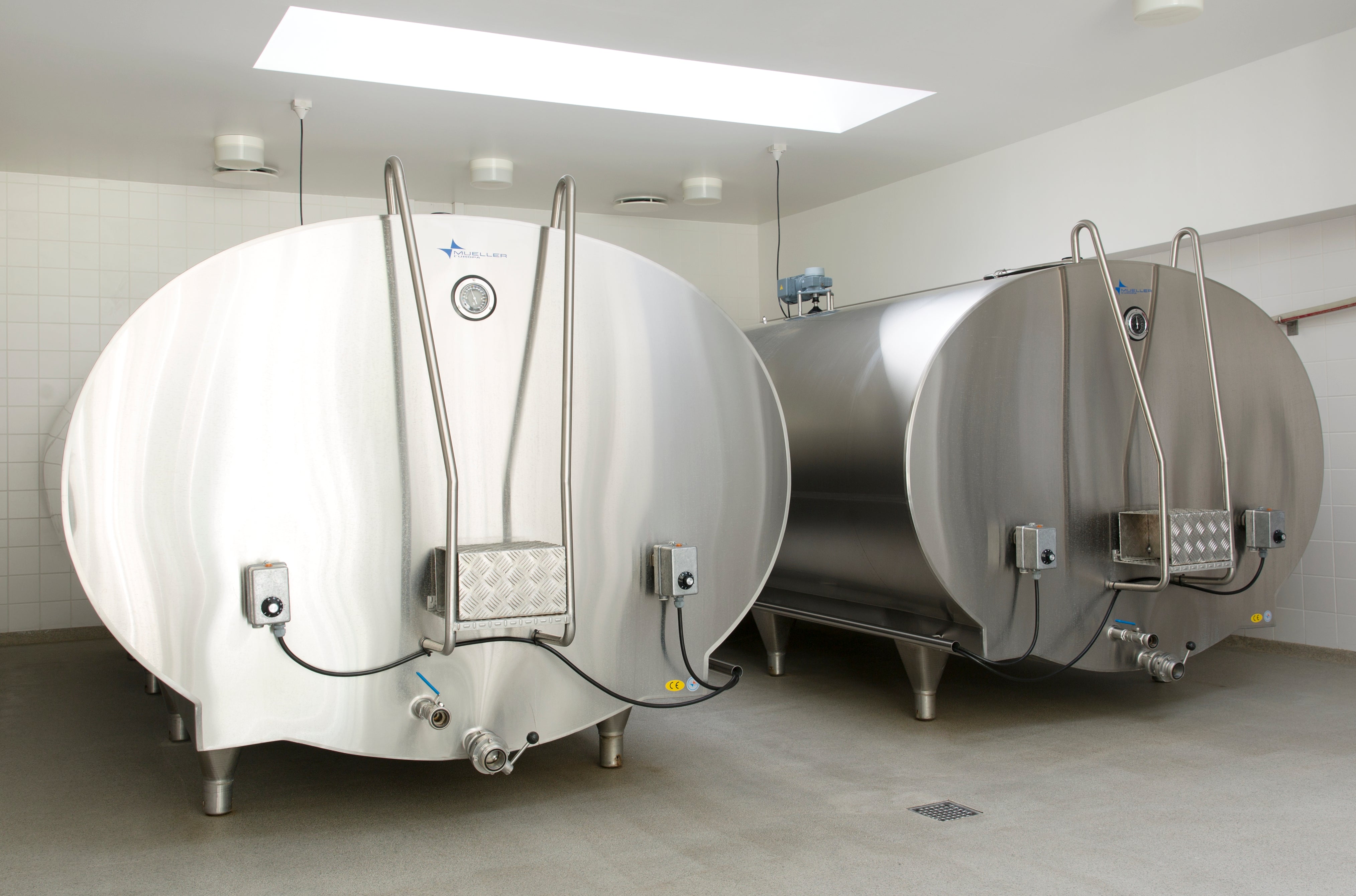
2. Fermentation
Our products are made through a natural fermentation process. Fermentation is one of the oldest methods for preserving products, but the process also has several other benefits.
Read more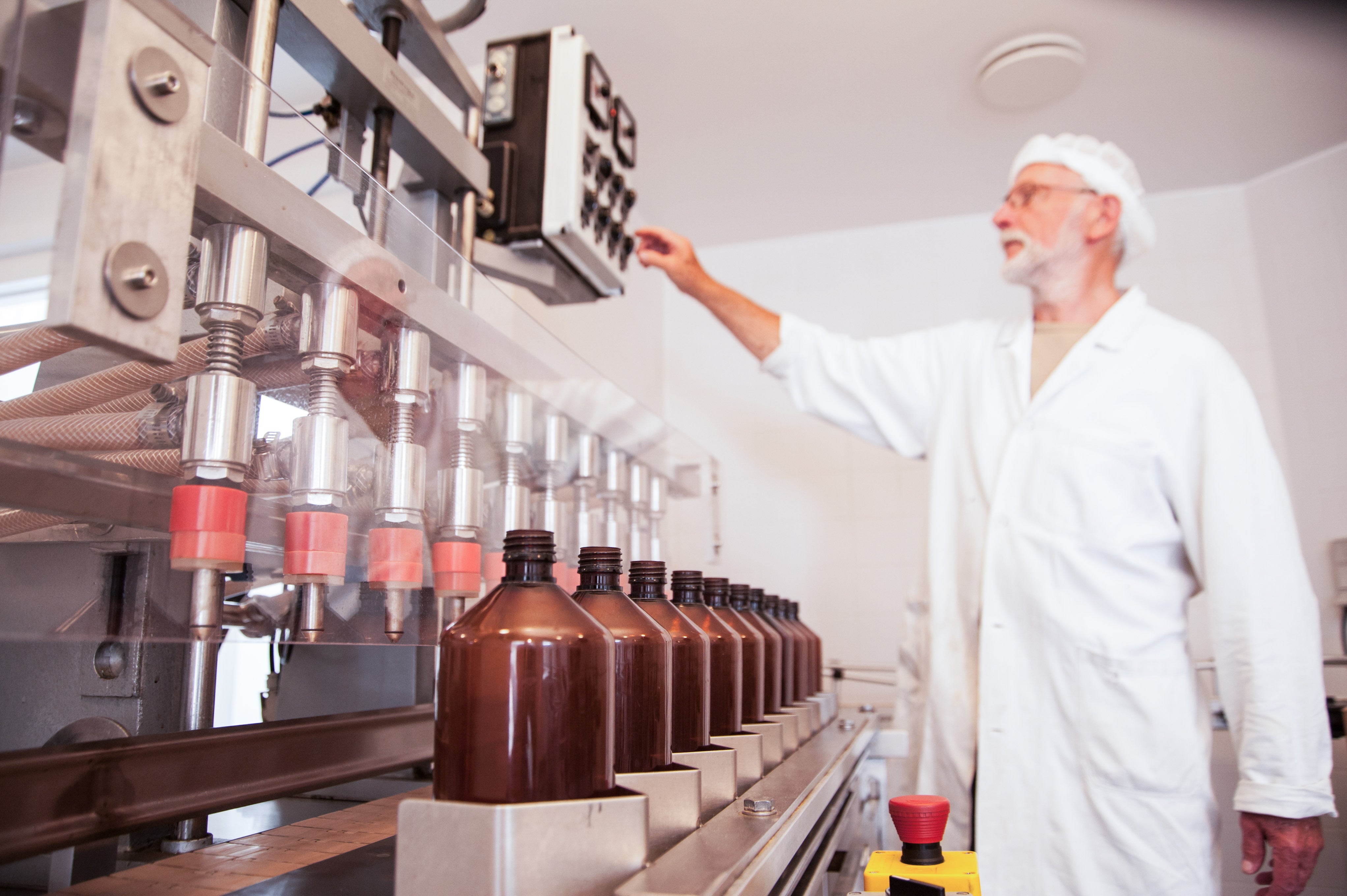
3. Packaging
In our production, we use bottles made from at least 50% recycled plastic (RPET) to reduce the amount of plastic waste.
Read more
4. Quality control
All our products are continuously checked, both by ourselves and by an externally accredited laboratory, to ensure that they meet our high quality standards.
Read more1. Raw ingredients
Biosa's raw materials are sourced from registered suppliers. As part of Biosa's ISO 9001 quality management system, our suppliers are evaluated at regular intervals to ensure that our high standards are maintained.
We use strains of bifido and lactic acid bacteria selected based on their different pH and temperature optima to optimize the fermentation process.
Lactic acid bacteria are essential for the fermentation process that our products undergo because they produce the organic acids, primarily lactic acid and acetic acid, which give our products a unique sour taste and ensure that they are self-preserving.
All our products are fermented with 19 organic herbs, partly to assist the fermentation process but also to give the products their unique full-bodied flavor. Along the fermentation process, the herbs are removed from the mixture, so our products only contain extract from the 19 herbs. All our herbs are certified organic.
Biosa's products are fermented with organic cane molasses, which has a sugar content of approximately 60%. Molasses is the brown mass left behind when the sugar, which later becomes refined white sugar, is extracted.
Our cane molasses' high content of easily digestible carbohydrates ensures an efficient fermentation process. The lactic acid bacteria convert the molasses into organic acids, primarily lactic acid and acetic acid. The fermentation process continues until all the sugar content is converted, and all Biosa's products are therefore sugar-free.
2. Fermentation
Fermentation has played a significant role in human diet and nutrition for thousands of years. The fermentation process occurs naturally in an oxygen-free environment, where carbohydrates are converted into organic compounds (such as lactic acid and acetic acid) with the help of yeast, bacteria, or a combination of these.
The benefits of fermentation include the conversion of sugars and other carbohydrates to create natural preservatives directly in the food, as seen in sour foods such as pickled dairy products, kombucha, and kimchi, where microorganisms produce organic acids directly in the product.
The main purposes of fermenting foods are:
- to develop and ensure taste, aroma, and textures.
- to make the product naturally self-preserving.
3. Packaging
All our bottles are made from at least 50% recycled PET (RPET). We encourage everyone to sort the bottles as hard plastic after use, so we can all help keep the recycled in circulation.
All the cardboard we use is produced from recycled paper to the highest extent possible – and can, of course, also be recycled.
There is no doubt that more that can be done, and fortunately, new initiatives in sustainable alternatives are constantly emerging. Therefore, we always try to stay updated on the latest research, challenge traditional thinking, and motivate towards a healthier lifestyle for each other, and our planet – through every choice we make!
4. Quality control
Throughout the production process, we closely monitor the fermentation process. We take samples from each batch, which are sent to a microbiological analysis at an accredited laboratory. This is to ensure feed and food safety and to monitor the development of lactic acid bacteria.
We measure the pH value frequently to ensure that the fermentation progresses as expected. It is an essential parameter as it reflects the production of organic acids (lactic acid and acetic acid). Thus, the pH value serves as an indicator of product quality.
The final part of our quality control occurs during bottling, where we taste-test our human products to ensure they have the desired, unique acidic taste.
As a company, we are also subject to inspections by the Danish Veterinary and Food Administration, which continuously monitor our production.
Biosa's raw materials are sourced from registered suppliers. As part of Biosa's ISO 9001 quality management system, our suppliers are evaluated at regular intervals to ensure that our high standards are maintained.
We use strains of bifido and lactic acid bacteria selected based on their different pH and temperature optima to optimize the fermentation process.
Lactic acid bacteria are essential for the fermentation process that our products undergo because they produce the organic acids, primarily lactic acid and acetic acid, which give our products a unique sour taste and ensure that they are self-preserving.
All our products are fermented with 19 organic herbs, partly to assist the fermentation process but also to give the products their unique full-bodied flavor. Along the fermentation process, the herbs are removed from the mixture, so our products only contain extract from the 19 herbs. All our herbs are certified organic.
Biosa's products are fermented with organic cane molasses, which has a sugar content of approximately 60%. Molasses is the brown mass left behind when the sugar, which later becomes refined white sugar, is extracted.
Our cane molasses' high content of easily digestible carbohydrates ensures an efficient fermentation process. The lactic acid bacteria convert the molasses into organic acids, primarily lactic acid and acetic acid. The fermentation process continues until all the sugar content is converted, and all Biosa's products are therefore sugar-free.
Fermentation has played a significant role in human diet and nutrition for thousands of years. The fermentation process occurs naturally in an oxygen-free environment, where carbohydrates are converted into organic compounds (such as lactic acid and acetic acid) with the help of yeast, bacteria, or a combination of these.
The benefits of fermentation include the conversion of sugars and other carbohydrates to create natural preservatives directly in the food, as seen in sour foods such as pickled dairy products, kombucha, and kimchi, where microorganisms produce organic acids directly in the product.
The main purposes of fermenting foods are:
- to develop and ensure taste, aroma, and textures.
- to make the product naturally self-preserving.
All our bottles are made from at least 50% recycled PET (RPET). We encourage everyone to sort the bottles as hard plastic after use, so we can all help keep the recycled in circulation.
All the cardboard we use is produced from recycled paper to the highest extent possible – and can, of course, also be recycled.
There is no doubt that more that can be done, and fortunately, new initiatives in sustainable alternatives are constantly emerging. Therefore, we always try to stay updated on the latest research, challenge traditional thinking, and motivate towards a healthier lifestyle for each other, and our planet – through every choice we make!
Throughout the production process, we closely monitor the fermentation process. We take samples from each batch, which are sent to a microbiological analysis at an accredited laboratory. This is to ensure feed and food safety and to monitor the development of lactic acid bacteria.
We measure the pH value frequently to ensure that the fermentation progresses as expected. It is an essential parameter as it reflects the production of organic acids (lactic acid and acetic acid). Thus, the pH value serves as an indicator of product quality.
The final part of our quality control occurs during bottling, where we taste-test our human products to ensure they have the desired, unique acidic taste.
As a company, we are also subject to inspections by the Danish Veterinary and Food Administration, which continuously monitor our production.

